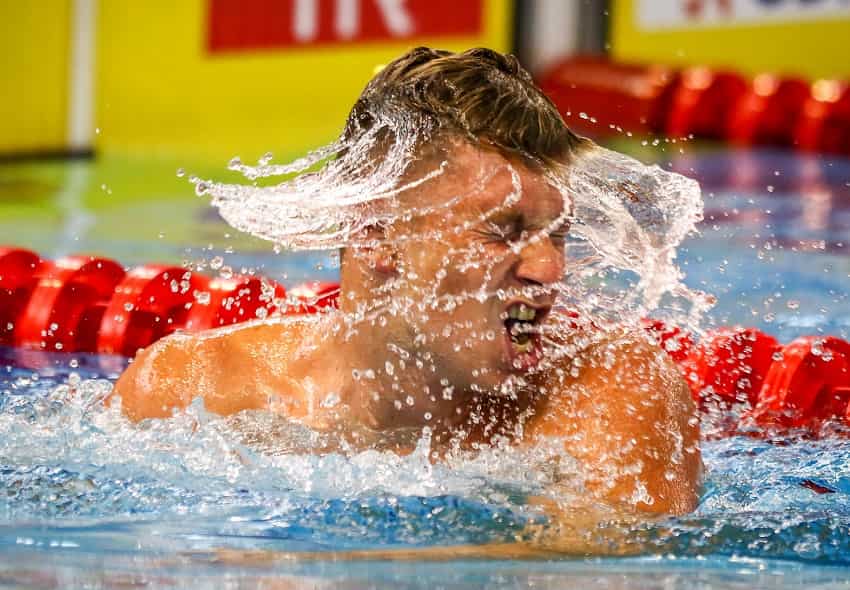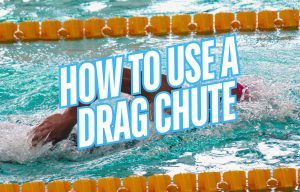Fed up with dry, brittle hair that’s been damaged by chlorine? Here is a 3 step plan for protecting your skin and hair and removing chlorine from your hair.
Here’s a fun fact you probably already know: Swimming is awesome exercise.
Hopping into the water and banging out a bunch of laps works your cardiovascular system, is easy on the joints, and provides a much-needed unplug from real life. By the time you slide out of the water, you are feeling great.
You also leave the pool with that unmistakable smell.
You know, Chlorine #5.
Whether you are chasing your dreams all the way to the Olympics, or hitting the pool for the occasional swim, dealing with chlorine is something we all work with.
Here’s the swimmer’s guide to protecting your hair from chlorine, both before and after your swim.
What Chlorine Does to Your Hair
Chlorine is a sanitizer used to keep swimming pools clean and safe for swimmers. It’s relatively harmless, sanitizes everything from algae to bacteria, and keeps pool water nice and clean.
But exposing your hair and skin to chlorinated water means that the moisture and oils are being sucked dry. Chlorine bonds to the proteins in your hair.
The result is hair that becomes brittle, dry, and damaged (i.e. split hairs).
Swimmers will notice that chlorine exposure even thins hair over time.
How to Keep Chlorine Out of Hair When Swimming
The easiest way to get chlorine out of your hair is to limit the amount that gets in there in the first place.
There are two quick and easy things you can do to do this.
Step 1: Get your hair wet before you jump into the pool.
How often do you actually follow the pool rules and shower off before you get into the water? For many of us, not often enough!
There are two big upsides to doing this—firstly, you rinse off body sweat and product (aftershave, deodorant, etc), keeping them from interacting with chlorine, which makes the pool cloudy and the air worse to breathe.
Secondly, getting your hair wet before you jump into the water actually makes the chlorine harder to break into your locks. When your hair is already is wet, it takes on less water.
Think of pre-soaking your hair before hopping into the pool as putting up a “no vacancy” sign on your head.
Step 2: Wear a swim cap.
Swim caps are funny devices for those unfamiliar with their actual function.
Many newbie swimmers give me the “Heh?” look when I tell them that swim caps don’t actually keep hair dry.
Nor do they keep water from going into your ears.
(That’s what swimming earplugs are for.)
Like, at all.
That’s not their purpose.
So why should you even bother wearing a swim cap at the pool?
For high-performance swimmers there is a resistance/drag effect, but wearing a cap keeps hairs from your head from drifting off into the shared water, clogging up the filtration systems and collecting in asteroid-shaped balls at the bottom of the pool.
In terms of protecting your hair, it also keeps the amount of chlorine-covered water reaching your hair at a minimum.
While lugging your favorite swim cap to the pool won’t help you keep your hair perfectly dry, it will safeguard your hair from excessive chlorine exposure.
Staff pick: Arena Soft Silicone Swim Cap
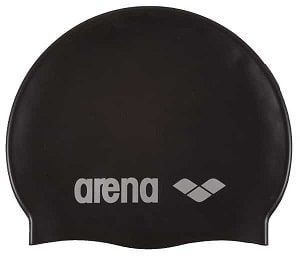


Step 3: Use a chlorine removal shampoo.
Our final stop on the chlorine-from-your-hair train is to use a chlorine-removal shampoo.
Specifically designed for swimmers and people who frequent the pool often, swim shampoos for chlorine removal use natural ingredients to neutralize and wash away chlorine, leaving your hair feeling healthy and moisturized.
Staff pick: UltraSwim Shampoo and Conditioner
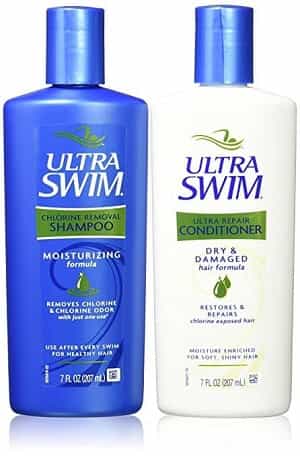


I’ve been a lifelong user of UltraSwim Shampoo and Conditioner (they even sponsor some of the high-level USA Swimming Grand Prix meets).
Other recommended swim shampoos include Paul Mitchell Shampoo Three (Amazon) and Malibu C Swimmer’s Shampoo (Amazon).
Things You Should Not Do to Protect From Chlorine
Put conditioner in your hair before getting into the water
I cannot tell you how many times I’ve gotten into a public pool and been overwhelmed by the scent of someone’s conditioner that has spread across the pool like an oil slick, mixing with chlorine and coating the air with chloramines.
Putting conditioner in your hair before you get in the water—and it drives me mental to see how many websites are out there promoting this terrible idea—ruins the air quality in the pool, screws up the pool chemistry, and just generally smells.
If you ever wonder why pool water gets cloudy, it’s often as a result of people who jump into the water without rinsing the lotions, creams, conditioners and other oils off their bodies.
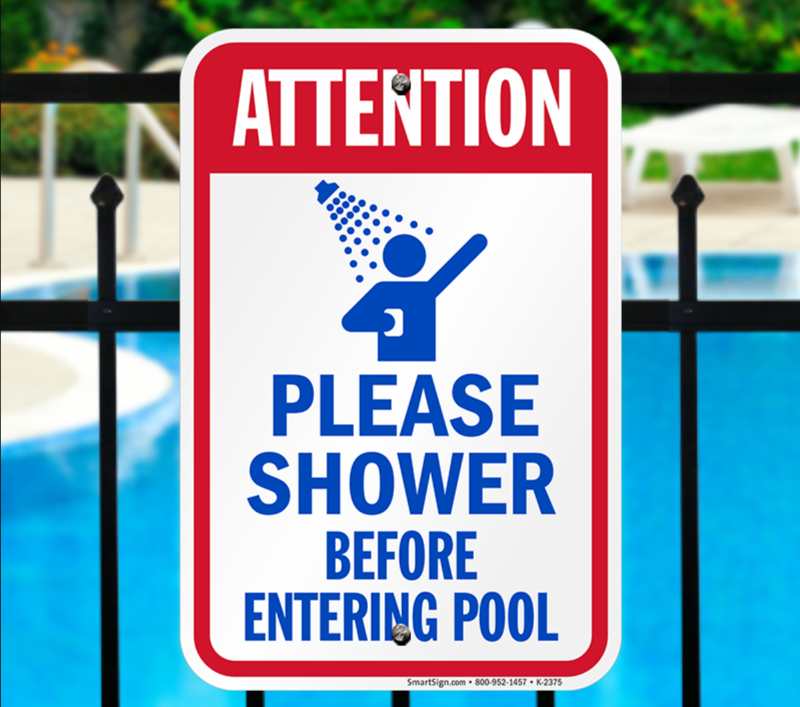
Free chlorine (the good kind that sanitizes everything) has to work overtime to subdue these foreign substances, turning into total chlorine (chloramines), which can cause respiratory problems and wheezing1.
See also: The 5 Best Body Washes for Swimmers and Chlorine Removal
A much better alternative (and a much more thoughtful alternative for your fellow swimmers and the people who maintain the pool) is to fully soak your hair with water before getting in the pool.
When the hair is already wet, it onboards less water (in this case, chlorinated water), reducing the chlorine exposure.
Frequently Asked Questions
How long does it take to get chlorine out of hair?
Chlorine can be rinsed out of hair with a single (but thorough) washing.
Swimmers with thicker, longer hair will obviously require more time to really rinse and wash it all out. Don’t forget to wash your body and face as the scent of chlorine will linger elsewhere, as well.
What happens if chlorine stays in your hair?
A single exposure to chlorinated pool water will do little.
It’s the repeated, extended exposure that can really start to cause damage to hair.
The more and the longer you have your head in the water, the more damage you are going to see in your locks.
If you are going to be swimming laps a lot, pack a swimmer’s shampoo, wear a swim cap, and rinse your hair before you jump into the water.
During my peak swimming days, when I was swimming 25-30hrs in the pool, my body hair would almost completely evaporate over the course of the season from chlorine exposure.
(It sure made shaving down for big swim meets a whole lot easier, though!)
Will chlorine turn my hair green?
Swimmers with lighter hair will notice that hair can turn green after swimming in the pool.
This isn’t chlorine that is doing this, but rather run-off from the metals in pool equipment (like pool ladders and piping).
The main culprits are copper and other oxidized metals.
Swimmer shampoos are formulated to help remove these metals and deposits as well as chlorine, which is likely why most swimmers mistakenly believe that it is chlorine that is the source of the discoloration.
The Bottom Line
There is a lot of myth and misinformation when it comes to protecting your hair from chlorine.
Fortunately, there are some exceedingly simple (and inexpensive) things you can do to protect and rinse your hair of chlorine.
To recap:
- Rinse your hair before jumping in the water to “load” your hair with fresh water
- Wear a swim cap to reduce chlorine water exposure
- Use a swimmer’s shampoo after your swim to rinse out any lingering chlorinated water
Follow these steps, and you will be able to enjoy all of the perks and benefits of swimming without smelling like chlorine all day long!

